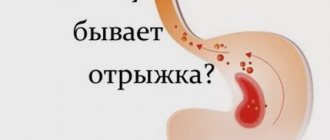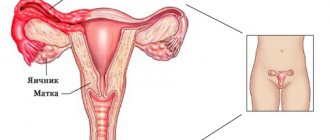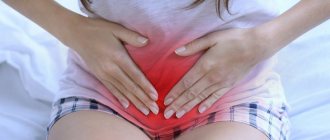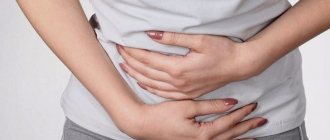Why is my stomach bloated?
Bloating in the lower abdomen causes great discomfort, which is why patients want to get rid of it as soon as possible. The following reasons can cause this condition:
- increased gas formation resulting from poor nutrition;
- dysbacteriosis;
- helminthic infestations;
- intestinal infections;
- disease of the abdominal organs, in which pain can radiate to the lower back;
- pancreatitis, in which patients will experience nausea and vomiting, as well as pain in the left side;
- intestinal obstruction;
- stomach upsets;
- weakened immune system;
- inflammatory processes in the intestines, which cause pain in the right or left lower abdomen;
- neoplasm;
- bad habits, in particular smoking;
- binge eating;
- talking while eating;
- intake of large amounts of air with food;
- dyspepsia – digestive disorder;
- food intolerance.
Poor diet can cause bloating
In women, the pathological process can be the result of the following factors: pregnancy, menstrual irregularities, menopause, endometriosis, uterine fibroids. In men, heaviness and bloating can be caused by prostatitis, the presence of kidney stones, cystitis, and diseases of the genital organs. In children, bloating is caused by overfeeding, a diet that is not appropriate for their age, and neoplasms.
Causes
Of course, a person who does not experience health problems will not experience sudden bloating and abdominal pain. It can be caused by digestive problems, both chronic, caused by diseases of the gastrointestinal tract, and as a result of metabolic disorders due to an unbalanced diet. One way or another, bloating occurs as a result of the accumulation of gases in the intestines; the medical term “flatulence” corresponds to this process. As a result, there is a fairly significant increase in the proportions of the abdomen, accompanied by a feeling that it is bursting from the inside - as a rule, the upper section especially suffers.
Diseases that cause bloating
Let's talk about common causes of flatulence.
Neurosis
Intestinal neurosis does not always occur in emotional people; in some cases, the problem occurs in balanced people who are accustomed to keeping their emotions deep in their souls. The disease can be provoked by conflict situations, mental stress, and poor nutrition.
Clinical symptoms of neurosis can be quite varied and largely depend on the stability of the nervous system. Bloating appears after eating and increases during the day. Flatulence is aggravated by pain and cramps. The pain intensifies after eating and in the evening.
Intestinal neurosis often appears against the background of emotional shock
Dysbacteriosis
Dysbacteriosis does not develop in healthy people; it signals trouble in the body. The basis of the pathological process is a change in the composition of microorganisms that inhabit the intestines. As a result, the number of beneficial bacteria decreases, while opportunistic microflora is activated.
Complete digestion of food and protection of the body is simply impossible without the participation of microorganisms that inhabit the intestines. Dysbacteriosis is often caused by uncontrolled antibiotic therapy, intestinal infections, gastrointestinal diseases, poor nutrition, and weakened immunity.
Intestinal obstruction
Intestinal obstruction is an acute pathology, which in terms of danger is equal to appendicitis and perforated gastric ulcer. A delay or even complete absence of passage of feces through the intestines occurs for a number of reasons:
- the presence of foreign bodies, polyps, malignant tumors;
- smooth muscle spasm;
- volvulus of a loop of intestine;
- adhesive process and more.
The first symptom of the pathology is an attack of pain. The abdomen swells after about twelve hours. There is severe vomiting. The main treatment method is surgery.
Diagnostics
If alarming symptoms develop, a woman does not need to do anything herself. It is better to consult a doctor who will diagnose and prescribe the optimal treatment. The following research methods are used to determine pathologies:
- Medical examination. He palpates the abdominal wall to determine the source of pain, evaluates the color of the skin, listens to the heart and lungs.
- Analysis of blood, urine, feces. Necessary for determining the general condition of the body and identifying disturbances in the functioning of basic life-support systems.
- Ultrasound diagnostics. With its help, it is possible to identify many pathologies based on the size, structure and structure of internal organs.
- Endoscopic diagnostics. Performed if gastrointestinal pathology is suspected. A special device with a camera is inserted into the digestive system, which records changes in the mucous membrane of the organs.
If a woman is suspected of having gynecological problems, she is scheduled for an examination by a gynecologist. He always takes swabs for microflora, to identify common sexually transmitted infections, and prescribes hormone tests.
How to recognize flatulence?
Symptoms manifest themselves in different ways, and their appearance is largely due to the immediate causes of flatulence. The following patient complaints indicate problems with the intestines:
- feeling of fullness in the abdomen;
- internal pressure on the stomach and bursting sensations;
- cramps in the abdomen and sharp pain that disappears after the passage of gas;
- discomfort in the epigastric region;
- rumbling in the stomach after eating;
- hiccups, belching;
- constipation or diarrhea.
Sometimes the problem is psychological in nature and appears after stressful situations.
Digestive mechanism
The digestion process begins in the mouth and ends in the rectum. Intensive digestion of food begins in the initial parts of the small intestine.
The essence of the digestion process is to grind the food eaten to such a state that the walls of the digestive tract can freely absorb nutrients. It is these beneficial substances that act as building materials for cells in the body.
The digestion mechanism is a complex of chemical reactions. In turn, they generate waste, i.e. those substances that do not take further part in the digestion process.
This waste gives the feces an unpleasant, characteristic odor. Some of them are transformed into gases. For this reason, they are excreted from the body during bowel movements. People call this process “going big.”
Why is my stomach swollen and painful? Because these gaseous substances accumulate in the body, they provoke bloating.
Why does it hurt in the lower abdomen?
In women, the most common cause of nagging pain from below is menstruation. If an unpleasant feeling appears in the middle of the menstrual cycle, this may indicate the onset of ovulation.
Patients' complaints that their lower abdomen hurts may be due to other reasons:
Abdominal pain due to constipation
- constipation;
- appendicitis. The typical location of pain is the right side;
- irritable bowel syndrome;
- prostatitis;
- cystitis;
- stones in the ureter;
- intestinal infections;
- diseases of the genitourinary system.
Diseases
Diseases that cause bloating include:
- Inflammatory diseases of the intestines and digestive organs. Patients develop Crohn's disease, pancreatitis, and colitis. In this case, the person feels a cutting or dull pain. It can be intense, increasing or constant. In most cases, the shade of the skin changes. Symptoms include high blood pressure, an increase in body temperature up to 38°C, hiccups, heartburn, shortness of breath, diarrhea or constipation.
- Violation of enzymatic deficiency, absorption, failure of digestive processes, the formation of pathologies and the release of bile acids. With such diseases, food enters the intestines undigested. In this case, food products are broken down only by microflora. Such diseases include dysfunction of the gallbladder and biliary tract. Diseases that disrupt the secretion of digestive enzymes include hepatitis, liver cirrhosis, pancreatic cancer, and celiac disease.
- Diseases of mechanical obstruction include stenosis, tumors, and adhesions.
- Dynamic diseases that impair the motor function of the gastrointestinal tract include peritonitis, strangulation of the mesentery, intoxication and severe infections.
- Non-inflammatory diseases of the digestive system include dysbiosis and nutrient intolerance.
- Circulatory diseases associated with circulatory disorders include stagnation of blood clots in the intestinal veins. With such congestion, patients have pain in the lower abdomen.
Gas-forming products
There are a huge variety of foods that contribute to gas formation in the intestines. These include foods containing carbons, lactose, coarse fiber, and yeast. Consider the list of such products:
- white cabbage causes fermentation in the intestines due to its high content of coarse fiber and sulfur;
- legume products: beans, peas. Such products are poorly processed in the stomach. In the intestines they are susceptible to attack by microorganisms. Before cooking, beans should be soaked in water, this will promote better digestion;
- dairy products. Some people cannot digest lactose at all. But fermented milk products, on the contrary, contribute to good intestinal function;
- raw vegetables and fruits: peaches, apples, pears, grapes, radishes;
- beer, kvass;
- fresh bakery;
- meat dishes;
- sweet carbonated drinks.
An important point in the process of gas formation is the combination of food products. The following products do not combine well with each other: fish and eggs, milk and baked goods, dairy and fermented milk products, multi-ingredient dishes.
Other reasons
Such problems with intestinal bloating can be caused not only by illness, but also by neglect of diet and certain rules and norms of food intake. Bloating can occur as a result of:
- uncontrolled consumption of drinks with a high concentration of gases: lemonade, kvass, soda, etc. Despite the fact that with one-time consumption there will be no negative consequences for the body of a healthy person, since the intestinal walls quickly absorb gases, abuse of carbonated drinks leads to their excessive accumulation;
- large amounts of air entering the stomach while eating. This happens when a person is in too much of a hurry and neglects to chew food thoroughly;
- consuming large quantities of foods, the processing of which in the stomach causes a fermentation process, which ultimately leads to the formation of gases. These products include all those that have a high content of fast carbohydrates, as well as starch and fiber, for example, various kinds of sweets, baked goods, potatoes, etc.;
- mixing products, the simultaneous use of which is undesirable. For example, it is recommended to eat fruits an hour before and one and a half to two hours after the main meal;
- using a soda-salt solution as a means of combating heartburn. Soda, when consumed in increased quantities, tends to reduce the acid concentration in the stomach, which inevitably leads to gas formation;
How to remove bloating?
Depending on the cause of bloating, you may need to consult a therapist, gastroenterologist, infectious disease specialist, oncologist, or neurologist. Mandatory consultation with a doctor is required for elderly people and children under three years of age.
Severe sharp pain in the lower abdomen is a reason to seek medical help
If you have digestive problems, it is extremely important to eliminate foods that do not cause fermentation and increased gas formation: rice and buckwheat porridge, vegetable soups, baked vegetables, low-fat cottage cheese, lean fish and meats. The following products reduce the formation of gases:
- fennel;
- dill;
- caraway;
- marjoram;
- ginger.
The most important thing in the treatment of flatulence is compliance with medical recommendations. First of all, you should make an appointment with a specialist and undergo an examination. If bloating is not accompanied by any additional symptoms, your doctor may prescribe the following:
- Motilium - this drug eliminates the problem and normalizes digestive processes;
- dietary nutrition;
- enzymatic preparations for better digestion of food;
- dill and chamomile infusions;
- To cleanse the intestines, in some cases it may be necessary to take a laxative.
If flatulence is accompanied by painful sensations, the doctor’s recommendations may change slightly:
- No-spa or its analogue Drotaverine is used to relieve muscle spasms;
- Espumisan will help remove accumulated gases;
- Pancreatin and Mezim normalize the functioning of the pancreas and stomach.
No-spa will help relieve muscle spasms
Consider the list of medications that doctors often prescribe for flatulence:
- Bifiform. The product regulates the balance of intestinal microflora;
- Cerucal is an antiemetic;
- Phosphalugel is an antacid drug that reduces stomach acidity;
- Enterosgel is used for intoxication.
Traditional medicine is used as an auxiliary aid. Let's look at the most common and effective recipes:
- field chamomile. Dry raw materials are poured with boiling water and infused. After the product has been filtered, it can be taken orally in a tablespoon five times a day. The infusion is good at calming the nervous system;
- ginger. The spice is added to tea or ready-made dishes. Chopped pieces of ginger are poured with boiling water and left for ten minutes. Take one tablespoon at a time;
- potato juice. Peel the vegetable and pass through a juicer. Should be taken on an empty stomach, 80 g;
- mint tea soothes and relieves bloating. You can use both peppermint and lemon balm.
Folk remedies
The arsenal of a natural pharmacy contains medicinal plants for the treatment of any disease.
- A decoction of chamomile flowers. Helps fight gases and has a disinfectant effect. A tablespoon of herb is poured with a quarter glass of boiling water. After 4 hours it is drained and the broth is ready. Drink a decoction of 50 g three times a day for a week.
- Pumpkin seed infusion. The course of treatment is two weeks. Take 100 g before meals. A tablespoon of crushed seeds is mixed with a teaspoon of honey and 0.5 liters. boiling water In 20 minutes. filter.
Prevention measures
The following recommendations will help you avoid flatulence: heat treat vegetables and fruits, season salads with vegetable oil - olive or sunflower, and do not wash down your food with sweet carbonated foods.
Use day-old bread rather than freshly baked bread. Soak the beans until completely swollen. Drink water thirty minutes before meals and at least half an hour after meals. Eat food in small portions and chew thoroughly. Lead a healthy and active lifestyle, avoid stressful situations.
Bloating in the lower abdomen is an unpleasant phenomenon that causes discomfort. In some cases, flatulence occurs due to the abuse of gas-forming products, overeating or bad habits.
In some cases, the cause of bloating can be a serious illness that requires emergency medical attention. The diagnosis is made by a specialist; you should not try on the role of a doctor. When the first alarming symptoms appear, contact a specialized institution.
Food allergies
An allergic reaction in the body can occur after eating citrus fruits, strawberries, honey, chicken eggs, fish and meat. In addition to bloating and skin rashes, indigestion is common.
Sometimes constipation, vomiting and belching occur. This pathological condition may indicate the development of intestinal dysbiosis.
Preventive actions
- Patients suffering from bloating are not recommended to lead a sedentary lifestyle. It is necessary to increase physical activity and play sports. In the morning you need to do exercises or gymnastics;
- Yoga is an excellent way to prevent bloating. This activity not only strengthens muscles, eliminates flatulence, but also balances a person’s mental state;
- Patients must make an appointment for massage sessions. You can perform self-massage of the lower abdomen. It is passed through with rotational movements, which involuntarily disperse the stagnant air;
- You need to monitor your diet. High-calorie, fatty foods and foods containing gases or preservatives should be avoided;
Bloating is an unpleasant symptom characterized by pain. This manifestation can occur in both children and adult patients. There are a large number of causes. Therefore, if symptoms appear in which the lower abdomen hurts, it is recommended not to delay treatment, but to consult a specialist for advice.
What can cause the lower abdomen to swell and bloat?
Woman.ru experts
Find out the opinion of an expert on your topic
Juran Marina Vladimirovna
Psychologist, Family child psychologist. Specialist from the site b17.ru
Korotina Svetlana Yurievna
Psychotherapist. Specialist from the site b17.ru
Pukemova Olga
Psychologist. Specialist from the site b17.ru
Kostenich Lyudmila Stanislavovna
Psychologist, Art therapist. Specialist from the site b17.ru
Marina Aleksandrovna Baydyuk
Psychologist, Analytical psychologist. Specialist from the site b17.ru
Valeria Bertnik-Yuryeva
Psychologist, Psychologist-guide. Specialist from the site b17.ru
Nevzorova Sofya Igorevna
Psychologist. Specialist from the site b17.ru
Alina Sysoeva
Psychologist, Coach and Trainer. Specialist from the site b17.ru
Ekaterina Alekseevna Vasyukhina
Psychologist, Crisis counseling. Specialist from the site b17.ru
Spiridonova Nadezhda Viktorovna
Psychologist. Specialist from the site b17.ru
as an option - from pregnancy
before menstruation, the uterus swells 2-3 days
From eating mostly apples or vegetables! This question is 15 years old!
the temperature is? It always happens to me before my period. not much, of course, just like a pregnant woman
Ovulation, this happens to me.
Related topics
From eating mostly apples or vegetables! This question is 15 years old!
the temperature is? It always happens to me before my period. not much, of course, just like a pregnant woman
Go back to the gynecologist and ask for an ultrasound of the appendages. Don't delay, it could be dangerous.
Most likely flatulence.
I have the same thing, and it became bloated after my period. There is absolutely no pain.
I got bloated in the same way after working out at the gym. If you press, it hurts, like a bruise.
I got bloated in the same way after working out at the gym. If you press, it hurts, like a bruise.
I have the same thing, after the gym and also my period, everything is mixed up. what it is.
Girls, I found a proven method on how to lose weight, tested on myself and my friends! Ginger bath soda has recently appeared on our market. Everyone knows that in water people lose weight on their own, but here there is a special soda that increases this effect, and even ginger. In addition to the fact that I lost weight, my skin also became tightened) We bought everything here: https://spa2013.ru/











